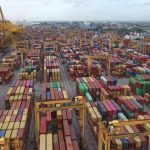Strikes in France have brought the country’s oil refineries close to a halt, driving a backlog of tankers stuck in limbo off the French coast, but high stockpiles have softened the impact on European diesel prices.
The strikes, which entered their fourth week on Monday, have helped close four of France’s six refineries, while port closures are crimping the flow of crude to the remaining two. The strikes are in opposition to pension reforms and have affected the transport, aviation, and energy sectors.
The number of ships loaded with oil idling outside French ports has jumped in recent weeks to its highest level since June 2016 during a similar bout of industrial action sparked by changes to France’s labor laws.
More than nine million barrels of crude and oil products were in floating storage off the French coast Wednesday, according to data from Kpler. Any loaded ship stationary for more than seven days is counted as floating storage.
Many are waiting outside of the port of Fos-sur-Mer, near Marseille on France’s southern coast, which has been beset by strikes. Some have been idle for over two weeks, including one tanker carrying more than 1 million barrels of Kazakh crude which has been anchored outside the port since Mar. 14, according to Kpler.
The port disruption has seen France’s crude imports plunge to just under 11 million barrels in March compared with more than 28 million barrels in February and almost 34 million barrels in January.
It has also cut off supplies to France’s two remaining operational refineries which are “running out of crude and have been operating at reduced run rates already,” Viktor Katona, lead crude analyst at Kpler, said.
The disruption to refineries has slashed France’s diesel supply by 200,000 barrels a day, according to estimates by Energy Aspects, an independent energy consultancy. The country’s six refineries have an annual capacity of around 1.16 million barrels a day.
Despite the widespread disruption, the impact on diesel supplies within France and on European prices has been modest.
Less disruption than expected to Russian diesel supplies, coupled with ample European stockpiles have softened the impact, while Europe-wide demand for diesel is muted amid concerns about the economy, said Jaime Llinares, a middle distillates reporter at Oil Price Information Service.
“The market is in a much more calm state than some months ago,” said Mr. Llinares. “Europe did a lot of diesel stock building in the winter…What is happening now is happening while Europe is relatively well supplied with diesel.”
Diesel refining margins tumbled from above $40 a barrel at the start of the year–when concerns about a European Union ban on Russian diesel imports were higher and winter storms hit U.S. refineries–to around $25 a barrel in late February, once the ban had come into place and resulted in less disruption than foreseen, according to OPIS data. The French strikes have helped push refining margins up to around $30 a barrel, said Mr. Llinares.
European benchmark diesel prices stood at $105.74 a barrel on Tuesday compared with $121.20 a barrel at the start of the year, according to OPIS. Prices have tumbled alongside crude prices in recent weeks due to concerns about the health of global banks.
OPIS is an energy-data and analytics provider that is part of Dow Jones, publisher of Dow Jones Newswires.
Meanwhile, only around 17% of French gas stations were missing at least one product this week, according to L’Union Francaise des Industries Petrolieres, France’s petroleum association, less than during another bout of strikes in October.
The impact on global crude markets has also been muted, which have benefitted from continued flows of Russian crude despite Western sanctions. The exception, however, is Nigeria, which has been one of France’s largest suppliers in recent months.
The strikes mean Nigeria is struggling to find buyers for its crude, while prices for its oil have slipped relative to Brent, the global oil benchmark, Mr. Katona said.
“Almost half of [Nigeria’s] April-loading schedule is still unsold, which is unprecedented,” he said.





